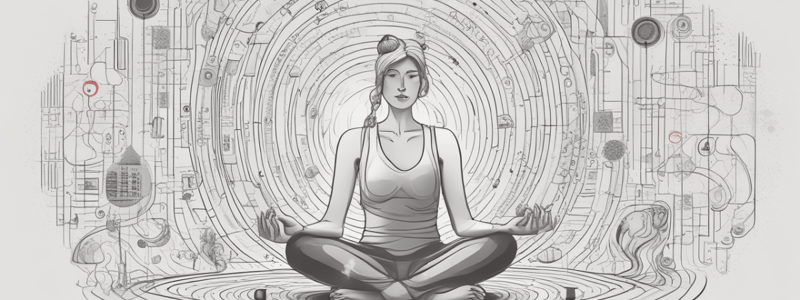Podcast
Questions and Answers
What has the author practiced for almost all their adult life?
What has the author practiced for almost all their adult life?
- Information Governance
- Knowledge Management
- Data Mapping
- Yoga (correct)
What is a key challenge faced by Information Governance Professionals (IGPs)?
What is a key challenge faced by Information Governance Professionals (IGPs)?
- Managing change and being flexible (correct)
- Implementing new technology
- Creating data maps
- User permissioning
What virtues does the author believe make difficult transitions easier to manage?
What virtues does the author believe make difficult transitions easier to manage?
- Technology, automation, and compliance
- Patience, persistence, and respect for others (correct)
- Leadership, teamwork, and communication
- Data analysis, classification, and mapping
What do vendors promise to automate in the practice of Information Governance?
What do vendors promise to automate in the practice of Information Governance?
Where did the author travel to study yoga more intensely?
Where did the author travel to study yoga more intensely?
What is notable about the author's yogi in the village?
What is notable about the author's yogi in the village?
What does the author believe IGPs must stay true to when leading others through the digital landscape?
What does the author believe IGPs must stay true to when leading others through the digital landscape?
What is the author's role, as mentioned in the content?
What is the author's role, as mentioned in the content?
What is the main reason the author attended a yoga studio?
What is the main reason the author attended a yoga studio?
What is the author's main concern when comparing herself to others in the yoga studio?
What is the author's main concern when comparing herself to others in the yoga studio?
What is the author's role in the context of information governance?
What is the author's role in the context of information governance?
What is the term used to describe redundant, outdated, and trivial data?
What is the term used to describe redundant, outdated, and trivial data?
Why did the Legal department spend a lot of money in discovery?
Why did the Legal department spend a lot of money in discovery?
What is the benefit of centralizing information assets for management?
What is the benefit of centralizing information assets for management?
What is the author's analogy between the yoga studio and the office?
What is the author's analogy between the yoga studio and the office?
What is the projected amount of data created, received, and stored globally by 2025?
What is the projected amount of data created, received, and stored globally by 2025?
What motivates employees to maintain their own shadow repositories?
What motivates employees to maintain their own shadow repositories?
What is the purpose of designing and maintaining a centralized repository?
What is the purpose of designing and maintaining a centralized repository?
What is the main theme of the passage?
What is the main theme of the passage?
What is the author's main concern about corporate information access?
What is the author's main concern about corporate information access?
What is the problem with the current approach to data access in corporations?
What is the problem with the current approach to data access in corporations?
What is the author's idea of the ideal approach to Information Governance?
What is the author's idea of the ideal approach to Information Governance?
What is the lesson learned from the executive's decision to limit data flow in the department?
What is the lesson learned from the executive's decision to limit data flow in the department?
What is the author's main point about the young yogi from Kochi?
What is the author's main point about the young yogi from Kochi?
What is the author's view on the role of algorithms in data access decisions?
What is the author's view on the role of algorithms in data access decisions?
What is the result of the executive's decision to limit data flow in the department?
What is the result of the executive's decision to limit data flow in the department?
What is the author's view on the role of administrators and stewards in data access decisions?
What is the author's view on the role of administrators and stewards in data access decisions?
What is the author's main point about Information Governance?
What is the author's main point about Information Governance?
What does the author believe is a common occurrence due to the rigid structure of most companies?
What does the author believe is a common occurrence due to the rigid structure of most companies?
Based on the analogy between yoga and Information Governance (IG), what does the 'late-coming yogi' represent in the context of IG?
Based on the analogy between yoga and Information Governance (IG), what does the 'late-coming yogi' represent in the context of IG?
What does the author suggest is a key benefit of integrating Information Governance (IG) into existing data security programs?
What does the author suggest is a key benefit of integrating Information Governance (IG) into existing data security programs?
According to the author, what is the essential element that allows for the successful implementation of Information Governance (IG)?
According to the author, what is the essential element that allows for the successful implementation of Information Governance (IG)?
Which of the following best reflects the author's perspective on the relationship between Information Governance (IG) and data security?
Which of the following best reflects the author's perspective on the relationship between Information Governance (IG) and data security?
The author uses the analogy of a 'living data map' to illustrate what aspect of Information Governance (IG)?
The author uses the analogy of a 'living data map' to illustrate what aspect of Information Governance (IG)?
What does the author suggest is the primary responsibility of Information Governance Professionals (IGPs)?
What does the author suggest is the primary responsibility of Information Governance Professionals (IGPs)?
What is the author's main message regarding the practice of Information Governance (IG)?
What is the author's main message regarding the practice of Information Governance (IG)?
What analogy does the author use to describe the individual's role in Information Governance (IG)?
What analogy does the author use to describe the individual's role in Information Governance (IG)?
What does the author suggest is the ultimate outcome of successful Information Governance (IG) practices?
What does the author suggest is the ultimate outcome of successful Information Governance (IG) practices?
Flashcards are hidden until you start studying
Study Notes
Information Governance and Corporate Culture
- The author, an IGP consultant, reflects on her 15 years of experience in information governance and how practices learned from yoga can be applied to her work.
- IGPs must be principled, yet flexible, and prioritize patience, persistence, and respect for others to manage change and transitions.
Playing Different Roles at Different Times
- The author recounts her experience practicing yoga in a remote self-sustainable community in India and learning from a young yogi who effortlessly moves between different roles without regard to hierarchy.
- This agility is essential in information governance, where IGPs must seamlessly move between tasks and address data-related issues regardless of where they are found or who is impacted.
Access to Information
- The author argues that access to information should be based on genuine business need, not title or position in the organizational chart.
- Relying solely on algorithms to determine access to data can lead to permission request loops and unprotected shadow repositories.
- Accurate decisions about data access require understanding the context of the work and the roles of individuals beyond their title.
Yoga is Not a Competition Sport
- The author compares the competitive nature of some corporate cultures to the individual focus of yoga practice.
- In both cases, comparing oneself to others can lead to unintended consequences, such as hoarding digital information to maintain a certain image.
- Centralizing information assets for management can reduce data growth and free individuals to work at their personal best.
Making Space for Each Other
- The author reflects on the importance of making space for others in the yoga studio and in the office.
- IGPs should approach others with respect, define their role, and maximize internal structures thoughtfully built by others to build connections between data sets.
General Lessons
- Patience, persistence, and respect for others are essential in managing change and transitions.
- IGPs should prioritize understanding the context of work and the roles of individuals beyond their title.
- Centralizing information assets for management can reduce data growth and free individuals to work at their personal best.
- Collaboration and making space for others are crucial in building connections between data sets and achieving corporate governance initiatives.
Studying That Suits You
Use AI to generate personalized quizzes and flashcards to suit your learning preferences.




